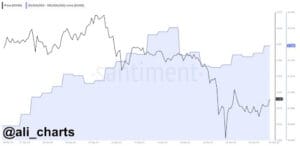Latest Filing Puts Regulator In Hot Seat With Crypto Firm On The Offensive
Ripple Labs has moved to challenge the SEC in the US Court of Appeals for the Second Circuit, filing a Form C cross-appeal to contest key aspects of the SEC lawsuit. This filing not only contests a previous ruling that classified certain XRP transactions to institutional investors as securities but also responds directly to the SEC’s October 16 appeal that questioned a favorable district court ruling for Ripple earlier this year.
Ripple’s Legal Rebuttal Through Form C Filing
Ripple’s filing of a Form C cross-appeal has sparked interest within both the legal and cryptocurrency communities, with Ripple Chief Legal Officer Stuart Alderoty confirming the move in a post on X. According to him, the lawsuit will not come with as much drama as the earlier parts of the case. The Appeals Court will only review the record that has already been set, and the SEC can’t submit new evidence or ask Ripple to produce more.
Today, Ripple filed a Form C – listing the issues we plan to raise on our cross appeal. A few things to keep in mind as we move forward:
The case is not about whether XRP, in and of itself, is a security. XRP is uniquely situated as having clarity (alongside BTC) in not being… https://t.co/AmFocAnbPx
— Stuart Alderoty (@s_alderoty) October 25, 2024
The appeal calls for a de novo review of all issues involved in the case, including whether Ripple’s transfers of XRP qualify as securities under the Howey test. The Howey test, which was established in a 1946 Supreme Court case, determines whether a transaction constitutes an investment contract by assessing factors like the investment of money and expectations of profits from the seller’s activities.
The request for a de novo review could have significant implications, as it essentially seeks a fresh look at these complex issues and how they could be applied to the cryptocurrencies and other aspects of the industry.
Challenging The SEC’s Stance On Cryptocurrency Regulation
Ripple’s Form C filing also aims to address what it describes as vague and inconsistent statements from the SEC on the application of securities laws to digital assets. The SEC has long argued that the sale of XRP is a security, requiring Ripple to follow federal securities regulations. However, Ripple’s latest Form C filing highlights the lack of regulatory clarity that has left the crypto industry unsure about compliance with SEC standards.
Based on applications of the Howey test, the court has determined that the sales of XRP to the general public were not securities. However, it also determined that sales of XRP to institutional investors in its early days were classified as unregistered securities offerings, prompting an order for Ripple to pay a $125 million civil penalty.
By asking for a de novo review and the application of the Howey’s test, Ripple is aiming to overturn the $125 million it was asked to pay.
The outcome of this cross-appeal could have far-reaching consequences for the broader cryptocurrency industry. If the court sides with Ripple, the ruling could serve as a precedent for future cases, potentially setting new limits on the SEC’s crackdown over the crypto industry. A ruling favoring the SEC might further solidify the regulator’s ability to apply securities laws to the industry.
Featured image from Fox Business, chart from TradingView







